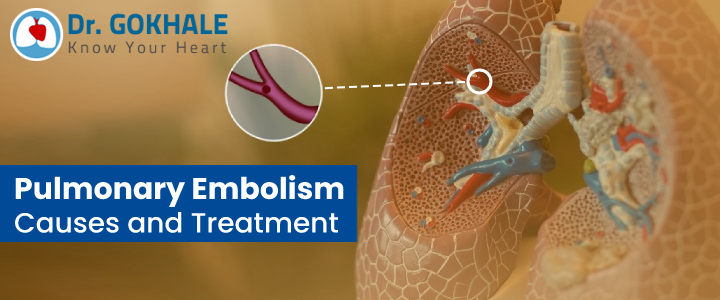Pulmonary Embolism is a life-threatening lung condition caused by blood clots that travel to the lungs from the deep veins in the legs or other parts of the body. “Any individual can develop pulmonary embolism, the risk further increases if the family members in the past are diagnosed with the blood clots”, says the best lung transplant surgeon in India, Dr Alla Gopala Krishna Gokhale.
A lung specialist and an authority in lung transplant surgery in in Hyderabad Dr Gokhale is also an expert in treating Pulmonary Embolism cases. With his inputs, we help you understand the true impact of Pulmonary Embolism, discuss its actual causes, symptoms and treatment options of the Pulmonary Embolism in this blog today:
What is Pulmonary Embolism?
Embolism is the blockage of an artery in the human body. And Pulmonary Embolism is a blockage of the pulmonary artery (lung artery) that carries deoxygenated blood from the heart to the lungs.
Lungs are where the exchange of gases takes place i.e. deoxygenated blood is oxygenated and returns to the heart for blood circulation to other parts of the body. The blockage to the pulmonary artery prevents the normal flow of the blood, disturbs the gas exchange and over time can cause permanent damage to the lungs.
How Pulmonary Embolism affects the body?
An embolus is a blood clot that travels freely in the blood until it settles down in the blood vessels to cause the blockage. In most cases, these blood clots settle down in the vein of the leg resulting in Dee Vein Thrombosis (DVT).
All the veins drain their deoxygenated blood into larger veins that route to the right side of the heart which send this blood into the lungs through the pulmonary artery. Thus these clots reach the lungs through the pulmonary artery triggering a slew of following problems:
- Restricted blood flow leads to lower oxygenated blood – and lower oxygen in the body.
- Lower oxygen levels can damage other body organs – brain, kidney and more.
- Stress on the right side of the heart pushes the blood hard, leading to lowered blood pressure.
- Multiple clots travel to other parts of the lungs creating even more problems.
What Causes Pulmonary Embolism?
“As said before, any patient can develop Pulmonary Embolism but certain conditions like cancer, heart diseases, surgery, damage to the lower leg, prolonged inactivity, inherited disorders or even COVID-19 may increase the chance of the clots happening”, the best lung specialist in Hyderabad Dr Alla Gopala Krishna Gokhale.
Symptoms of Pulmonary Embolism:
Shortness of breath, chest pain and cough are some of the common symptoms identified in PE patients. In addition to them, irregular heartbeat light-headedness, fever excessive sweating, swelling of the leg or pain, discoloured skin are other symptoms that can show up in Pulmonary Embolism cases.
Treatment for Pulmonary Embolism:
The treatment goal for Pulmonary Embolism is to break and dissolve the current blood clots and prevent the formation of others. Medications like Anticoagulants, Thrombolytic, procedures like Catheter-assisted thrombus removal, and vena cava filter are recurrently used to treat Pulmonary Embolism cases.
The procedure and its efficiency depend on how soon the clots are detected and treated by a lung specialist. If you are experiencing the above symptoms then we advise you to consult a lung specialist as soon as possible. If you are living in Hyderabad and seeking treatment for Pulmonary Embolism in Hyderabad, you can contact here: 9603040506














